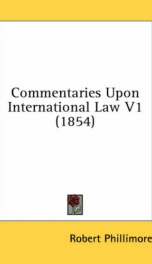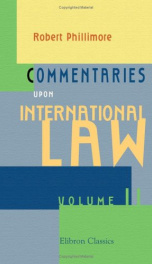commentaries upon international law

Purchase of this book includes free trial access to www.million-books.com where you can read more than a million books for free. This is an OCR edition with typos. Excerpt from book: 1. An inquiry into the origin and nature of the Laws which govern international relations (leges.) 2. The Subjects of these .laws. The original and immediate subjects are States considered in their corporate character. 3. The Object of these laws. These objects are Things, Rights, and the Obligations which correspond to them (Res, Jura, Obligationes.) 4. Certain Subjects of these laws which, though only to be accounted as such mediately and derivatively, yet, for the sake of convenience, require a separate consideration. These Subjects of International Law are the following individuals who are said to represent a state : 1. Sovereigns. 2. Ambassadors. Also another class of public officers who are not clothed, accurately speaking, with a representative character, but who are entitled to a quasi diplomatic position, namely 3. Consuls. 4. Lastly, the International Status of Foreign Spiritual Powers, especially of the Pope, requires a distinct consideration. XIV. Public International Rights, like the Private Rights of an Individual, are capable of being protected and enforced by Legal Means. These Legal Means are of two kinds, aptly expressed by jur- p ,. , ists as being (1) via amicabili, and (2) viäfacti. L J 1. Via amicabili. ( ¡' Negotiation. ( 2. Arbitration. (1. Reprisals. 2. Embargo. 3. War. When war has actually begun, we enter upon the jus belli, which is to be considered with reference to 1. The Rights of Belligerents ; 2. The Rights of Neutrals " Seqnitur enim de jure belli : in quo et suscipiendo, et yerendo, et de- poncndo, jus, ut plurimum valet, et fides.(a) For the wars (as Lord Bacon says) are no massacres and confusions, but they are the highest trials of right."(6) Grotius points out, with his usual sound an...
Users who have this book
Users who want this book
What readers are saying
What do you think? Write your own comment on this book!
write a commentGenre
if you like commentaries upon international law try:
Do you want to exchange books? It’s EASY!
Get registered and find other users who want to give their favourite books to good hands!



